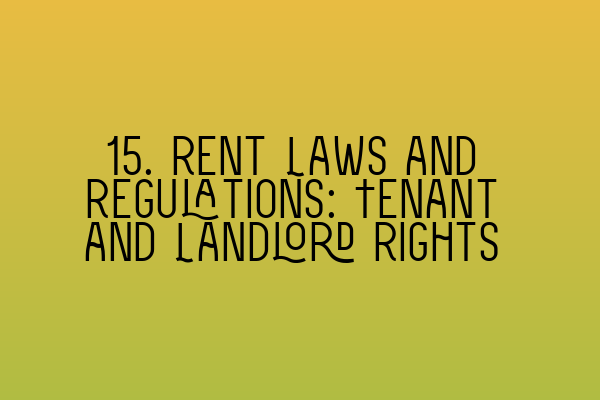Rent Laws and Regulations: Tenant and Landlord Rights
When it comes to renting a property, both tenants and landlords have specific rights and obligations that they need to be aware of. Understanding these rent laws and regulations is crucial to ensure a harmonious and fair relationship between both parties. In this article, we will explore 15 important rent laws and regulations that every tenant and landlord should know.
1. The Right to Quiet Enjoyment
The right to quiet enjoyment ensures that tenants can peacefully and without disturbance occupy their rented property. This means that landlords cannot interfere with their tenant’s use and enjoyment of the property without a valid reason.
For more information about other important legal aspects in property law, you may want to take a look at our SQE 1 Practice Exam Questions or SQE 1 Practice Mocks FLK1 FLK2.
2. Security Deposits
Security deposits are one of the most common aspects of renting. Landlords have the right to request a security deposit from tenants to cover any potential damages to the property or unpaid rent. However, there are certain regulations in place that limit the amount landlords can charge and dictate how the deposit should be handled.
3. Tenancy Agreements
Tenancy agreements establish the terms and conditions of the rental agreement between the tenant and the landlord. It is crucial for both parties to have a written and signed tenancy agreement that clearly outlines the rights, duties, and responsibilities of each party.
4. Rent Increases
Landlords have the right to increase rent, but these increases must be done following specific regulations. Typically, a landlord must provide a written notice and adhere to any restrictions set by local rent control laws.
For more information about SQE exam preparation, you may want to check out our SQE 2 Preparation Courses and SQE 1 Preparation Courses.
5. Repairs and Maintenance
Landlords have a legal obligation to keep the property in a habitable and safe condition. This means taking care of necessary repairs and maintenance work. Tenants should promptly notify the landlord of any issues and allow reasonable time for repairs to be made.
6. Discrimination Laws
It is illegal for landlords to discriminate against tenants based on factors such as race, religion, gender, or disability. Tenants should be aware of their rights and seek legal advice if they believe they have been discriminated against.
7. Entry and Access
Landlords typically have the right to access the property for inspections, repairs, or to show the property to potential tenants. However, they must provide reasonable notice and respect the tenant’s right to privacy.
8. Evictions
Evicting a tenant is a legal process that must be followed according to specific regulations. Landlords cannot simply evict a tenant without a valid reason or without going through the proper legal procedures.
9. Subletting
Tenants may have the right to sublet their rented property to another person. However, this is often subject to the landlord’s approval and specific conditions outlined in the tenancy agreement.
10. Rent Control Laws
Some jurisdictions have rent control laws in place to protect tenants from unfair and exorbitant rent increases. These laws may place restrictions on how much landlords can increase rent and when increases are allowed.
11. Tenant’s Right to Privacy
Tenants have the right to privacy and their landlord cannot enter the property without proper notice and a valid reason. Landlords must respect their tenant’s privacy and only enter the property when necessary.
12. Holding Deposits
Holding deposits are often used to secure a property before signing a tenancy agreement. However, landlords must adhere to regulations regarding holding deposits, including refunding the deposit if the tenancy does not proceed.
13. Deposit Protection Schemes
Deposits paid by tenants must be protected in a government-approved tenancy deposit protection scheme. Landlords have a legal obligation to protect tenants’ deposits and provide them with information about the scheme being used.
14. Illegal Activities
Landlords have the right to take legal action against tenants engaging in illegal activities on their property. Similarly, tenants have the right to expect a safe and secure environment free from illegal activities.
15. Rent Arrears
If a tenant falls into rent arrears, landlords have the right to take legal action to recover the unpaid rent. However, landlords must follow specific procedures and cannot resort to self-help measures.
For more information about upcoming SRA SQE exam dates, you may want to visit our page on SRA SQE Exam Dates.
Understanding rent laws and regulations is essential for both tenants and landlords to ensure their rights are protected and that they maintain a fair and respectful relationship. Whether you are a tenant or a landlord, familiarize yourself with these laws to make informed decisions and avoid potential legal issues.
